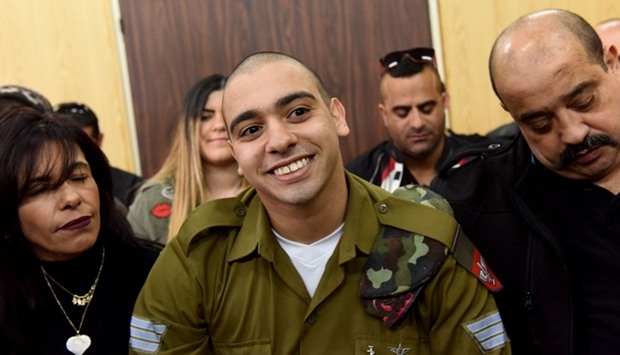Charlie Azaria told a military court that he believed his son Elor and his family had suffered enough since the soldier was arrested some 10 months ago.
"I want to tell you that this punishment of 10 months is enough," the long-time former police officer testified at the hearing in a court at Israel's defence headquarters in Tel Aviv.
"It has been 10 months since we stopped living. We are suffering. After everything I've given to the country, this is physical and psychological abuse ... We are out of energy," he added, breaking down in tears.
Sergeant Azaria, 20, a dual French-Israeli national, was applauded by his family when he arrived for the hearing, with his mother taking him in her arms.
Azaria was not to be sentenced in Tuesday's hearing, with witnesses testifying about his character before prosecutors submit their recommendations.
His army counsellor, a former teacher and fellow soldiers were among those testifying on Azaria's behalf.
Azaria faces up to 20 years in prison, though there have been reports that prosecutors will recommend between three and five years.
His case has sparked political tensions.
Prime Minister Benjamin Netanyahu, who heads what is seen as the most right-wing government in Israeli history, has called for him to be pardoned.
Right-wing ministers have defended Azaria despite top army brass condemning his actions in an extraordinary public rift between politicians and the military.
'Deserved to die'
The March 24 shooting in the occupied West Bank city of Hebron was caught on video and spread widely online.
It showed Abdul Fatah al-Sharif, 21, lying on the ground, shot along with another Palestinian after stabbing and wounding a soldier, according to the army.
Azaria then shoots him again in the head without any apparent provocation.
Convicting him of manslaughter on January 4 after a months-long trial, a three-judge panel ruled there was no reason for Azaria to open fire since the Palestinian was posing no threat.
Judge Colonel Maya Heller called his testimony "evolving and evasive".
"His motive for shooting was that he felt the terrorist deserved to die," she said.
When the verdict was announced, dozens of Azaria supporters scuffled with police outside military headquarters in Tel Aviv.
Arrests were also made in the days afterwards following threats against the judges, prosecution and the army chief of staff.
As the hearing began on Tuesday, around 50 protesters gathered outside with a sign that read "The people support and salute the hero, soldier Elor Azaria."
They were surrounded by around 60 police officers.
Azaria's defence lawyers on Tuesday also sought to include in the hearing details of a meeting between the soldier's father and military officials who allegedly urged him not to appeal the verdict.
Prosecutors said there was no relevance to the sentencing, and the judges ruled against the defence.

